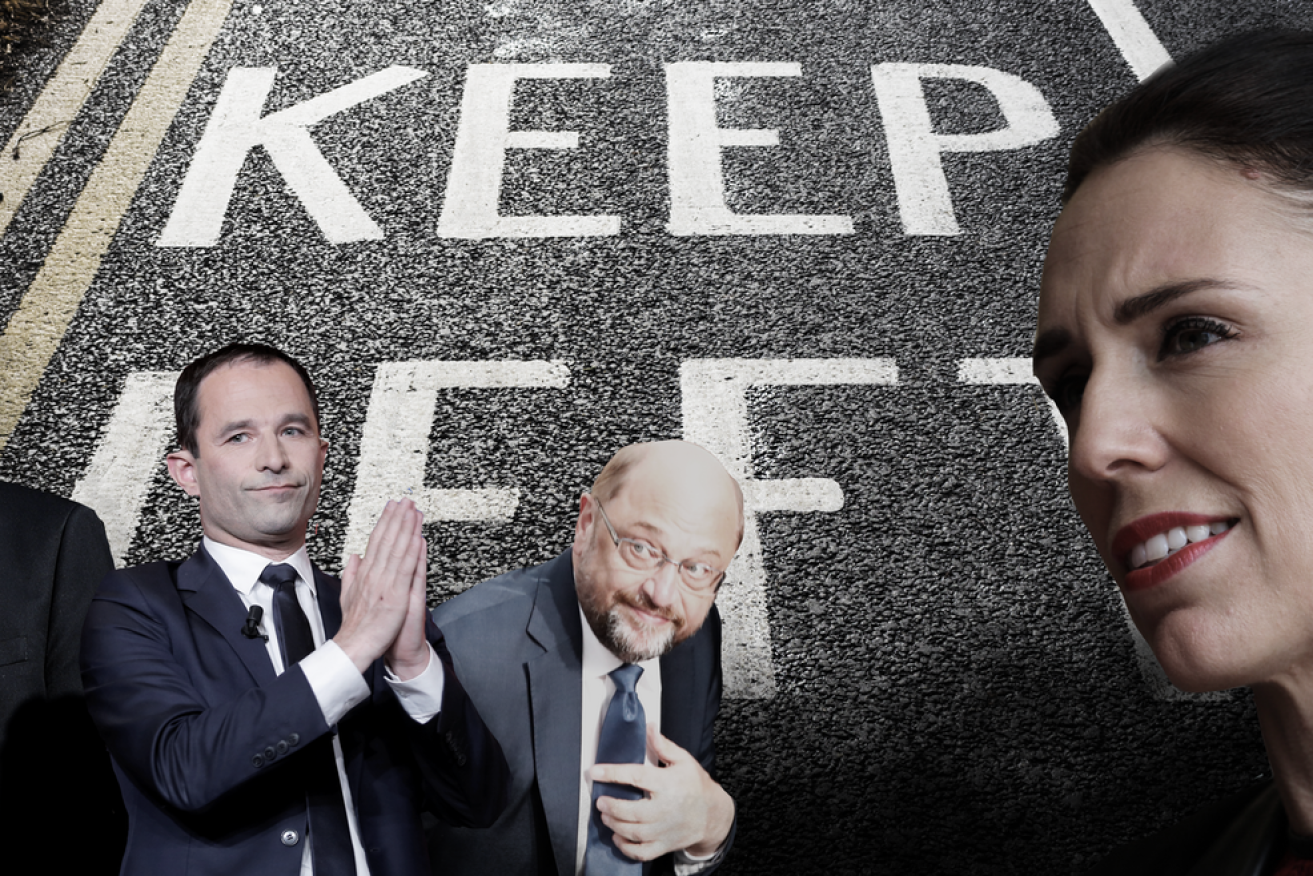Centre-left parties doing hard labour
For political junkies, 2017 has been a bumper year for elections, particularly across Europe.

Can the left bounce back? The UK Labour’s Jeremy Corbyn, French Socialist Party’s Benoit Hamon and German socialist party leader Martin Schulz certainly hope so, as does New Zealand Labour’s great hope, Jacinda Ardern. Reuters, Ulysse Bellier/Flickr, Shutterstock
This year, we have already seen key elections in the in the Netherlands, France, and the UK. Elections have just taken place in Norway, Germany and New Zealand, and crucial elections are also due in Austria by the end of the year.
If we add the 2016 US Presidential result to these – we might see something of a pattern emerging – mostly (but not always), the major centre-left party is failing to take office.
In the Netherlands, the concerns about the populist challenge of Geert Wilders tended to mask the Dutch Labour party’s (PvDA) disastrous result where it lost 29 seats and secured just 5.7% of the vote. In France, the phenomenal rise of Emmanuel Macron to the Presidency was striking because neither of the two major established parties made the second round. Moreover, Benoït Hamon the Parti socialiste candidate, secured a historic low for the centre-left with just 6% of the vote.
In the UK, the centre-left is in unchartered territory since the surprising elevation of Jeremy Corbyn. In June, Corbyn’s Labour secured 30% of the vote, and increased the number of its MPs by 30, and even some of his harshest critics were surprised by his performance. Yet, Labour has lost three elections on the trot since 2005, and has been unable to take full advantage of the carnage wrought by the Brexit referendum.
The results in Germany, Norway and New Zealand have also been poor for the centre-felt. In Norway, Labour (Ap) leader Jonas Gahr Støre was unable to displace the centre-right coalition headed up by ‘Iron’ Erna Solberg. In Germany, the so-called ‘Schulz effect’ has dissipated and the SPD crashed to one of its worst ever results. Angela Merkel comfortably won her fourth straight election.
In Austria, the centre-left social democrats (SPÖ) and the centre-right (ÖVP) have dominated, but the politics of the far-right pose new and awkward dilemmas – especially from the FPÖ. Reflecting a new, harsh reality, the SPÖ under the leadership of Christian Kern (also Austria’s current Chancellor), has broken a 30 year rule which means that it might consider a coalition with the far-right FPÖ. In Australia, like France and elsewhere, the old party system is fragmenting.
Closer to home, the unexpected rise of Jacinda Ardern as Labour saw the centre-left do better than expected it still only won 45 seats t the centre-right National’s 58. Crucially, they have been unable to dominate New Zealand politics for quite some time.
From this brief survey, it is clear that the centre-left is either either losing, or can’t win outright. This seems a long time since the point in the early 1990s when the centre-left led 15 out of then 17 EC states. In a forthcoming volume with my colleague Paul Kennedy, we explore the reasons for why the left are losing. We identify some common problems, but also some specific ones.
First, it’s worth pointing out, that whilst the state of the centre-left is poor, we should be careful in claiming it’s a trend, or for some, the ‘death’ of social democracy. Liberal democracy depends on parties winning, and also losing office. In many cases, the UK for example, the electoral record of the left has been was patchy at best. Moreover, recent results also belie the fragility of the mainstream centre-right (e.g. France, UK).
In our analysis, we focus on three broad themes – the role of individuals (especially leadership), the role of ideas, and the influence of institutional or structural factors.
Politics, to some extent, has become increasingly personalised – which means that political leaders face new and additional pressures. In many places, the centre-left has not done a great job in finding credible or convincing leaders (Sweden, Germany). Adhern seems to offer a dynamic form of leadership, but as Martin Schulz discovered, but this can only partially conceal unresolved policy problems.
The Centre-left has been unable to deal with a range of structural and ideational problems. In the 1990s, the ‘third way’, for all its legion problems, was a seemingly electorally winning formula for the reinvention of the centre-left. Since then, in many places, the ‘third way’ remains a hangover, and there is a vacuum for what it stands for. The left has struggled in reformulating its political economy, and especially the issue of immigration. The centre-left has also suffered in structural terms with populist parties being a particular threat, both from the right (Austria), and also the left (Spain).
As the results in New Zealand and Germany attest, it remains far from clear how the family of centre-left sister parties, including the ALP, are dealing with some of the wider ideational and structural issues.
This article was first published in The Conversation here





